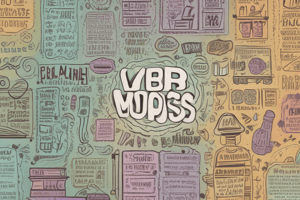Podcast
Questions and Answers
What does the verb mood relate to?
What does the verb mood relate to?
- How a thought is expressed in the sentence (correct)
- The place where the action occurs
- The time when the verb is used
- The person performing the action
Which mood is used for making basic statements?
Which mood is used for making basic statements?
- Indicative (correct)
- Conditional
- Subjunctive
- Interrogative
What is the term used for questions in verb moods?
What is the term used for questions in verb moods?
- Declarative
- Imperative
- Interrogative (correct)
- Assertive
If a sentence expresses an opinion, which mood is typically used?
If a sentence expresses an opinion, which mood is typically used?
Which mood is limited and used for asking questions?
Which mood is limited and used for asking questions?
When classifying questions and statements, what distinction is made?
When classifying questions and statements, what distinction is made?
What mood should you use when setting the conditions for something to happen, whether realistic or unrealistic?
What mood should you use when setting the conditions for something to happen, whether realistic or unrealistic?
In which mood should you express a wish or hope that cannot be real or factual?
In which mood should you express a wish or hope that cannot be real or factual?
Which mood is used to give advice or make a command?
Which mood is used to give advice or make a command?
What verb can be used in the conditional mood to express a real possibility?
What verb can be used in the conditional mood to express a real possibility?
Which mood is used to make a suggestion that is contrary to fact?
Which mood is used to make a suggestion that is contrary to fact?
If you want your wish or outcome to depend on something else happening first, which mood should you use?
If you want your wish or outcome to depend on something else happening first, which mood should you use?
Study Notes
Verb Moods
- The verb mood relates to the attitude or feeling conveyed by a verb, such as fact, command, wish, or possibility.
- The indicative mood is used for making basic statements, which express facts or opinions.
- Interrogative is the term used for questions in verb moods.
- When expressing an opinion, the subjunctive mood is typically used.
- The interrogative mood is limited and used for asking questions.
- When classifying questions and statements, the distinction is made between the interrogative and indicative moods.
Conditional Mood
- The conditional mood should be used when setting the conditions for something to happen, whether realistic or unrealistic.
- The verb "can" can be used in the conditional mood to express a real possibility.
Subjunctive Mood
- The subjunctive mood should be used to express a wish or hope that cannot be real or factual.
- The subjunctive mood is used to make a suggestion that is contrary to fact.
Imperative Mood
- The imperative mood is used to give advice or make a command.
Expressing Wishes and Outcomes
- If you want your wish or outcome to depend on something else happening first, the conditional mood should be used.
Studying That Suits You
Use AI to generate personalized quizzes and flashcards to suit your learning preferences.
Description
Learn about the different verb moods like indicative, interrogative, imperative, conditional, and subjunctive. Explore how each mood expresses attitudes towards a subject in a sentence.




